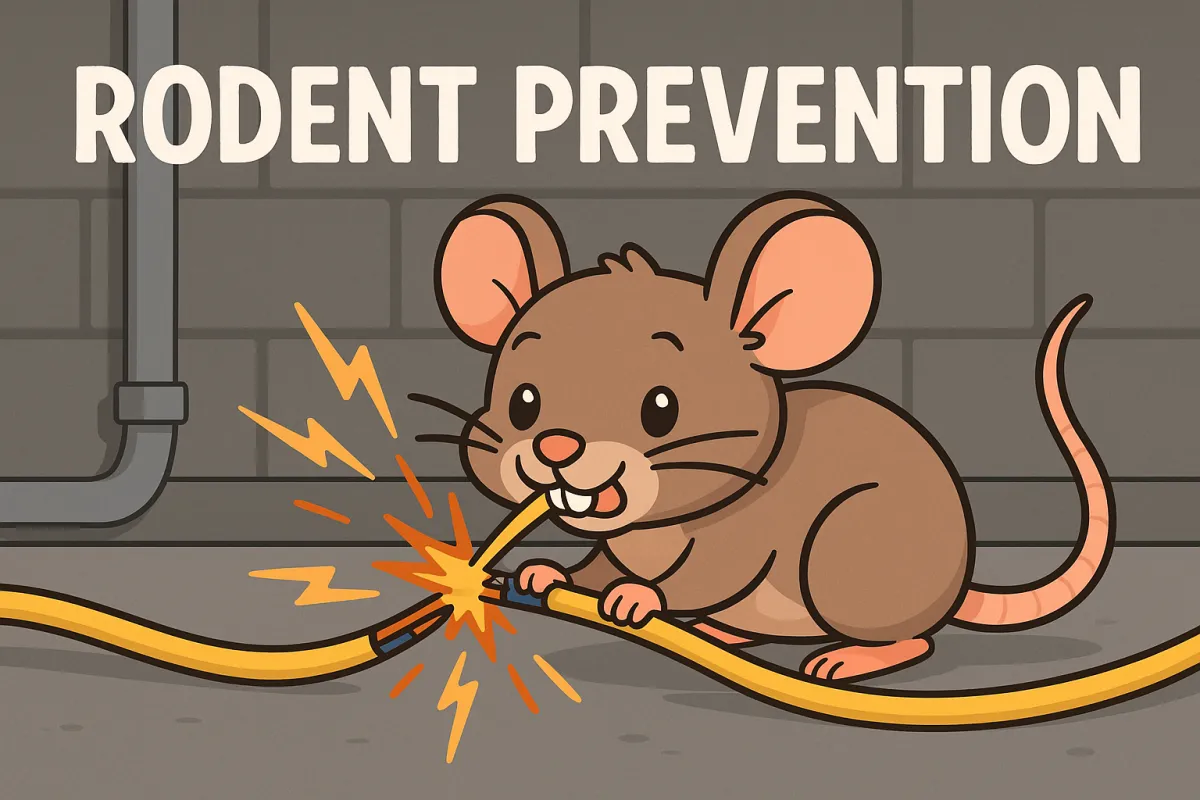
Rodent Prevention Plan Every Homeowner Should Follow
Introduction
Rodent prevention is one of the smartest ways you can protect both your home and its value. Mice and rats don’t just sneak in for food, they can chew wiring, damage insulation, and even spread disease. According to the National Pest Management Association, rodents invade an estimated 21 million U.S. homes each winter (https://www.pestworld.org/).
As a local Realtor® serving Tolland, Windham, Hartford, New London, and Middlesex counties, I’ve seen firsthand how small maintenance issues — like rodent damage — can turn into big problems during home inspections. That’s why I put together this step-by-step rodent prevention plan you can follow to keep your home safe, healthy, and market-ready.
Why is rodent prevention important for Connecticut homeowners?
Rodents can cause thousands of dollars in damage by chewing wires, insulation, and wood. Even worse, signs of infestation can reduce a home’s value during inspection. In our Connecticut market, where buyers are thorough and inspections are strict, rodent prevention protects both your investment and your peace of mind.
How do you seal and sanitize your home against rodents?
The first line of defense is sealing entry points and removing attractants.
Seal gaps and cracks: Use steel wool plus caulk or hardware cloth to block openings larger than ¼ inch (for mice) or ½ inch (for rats). Pay special attention to attics, basements, crawlspaces, and areas around plumbing or wiring.
Remove food sources: Store pantry goods in airtight containers, wipe counters, and avoid leaving pet food out overnight.
Tidy the yard: Keep grass trimmed, woodpiles off the ground, and trash sealed tightly. Rats especially thrive in cluttered yards.
What are the best natural repellents for mice and rats?
Natural repellents can deter rodents without harsh chemicals.
DIY Spray (short-term): Mix water, corn mint oil (or peppermint), citronella, and a few drops of dish soap. Spray at entry points and baseboards.
DIY Solid Blocks (long-term): Melt beeswax or soy wax with linseed oil, corn mint, and citronella oils. Place in attics, garages, or basements and replace every 4–6 weeks.
Commercial Repellents: Products like Fresh Cab® (EPA-registered, balsam fir oil-based) or Grandpa Gus’s peppermint pouches last longer and are stronger than DIY sprays.
Which traps actually work for rodent control?
Traps remain one of the most effective tools for getting rid of mice and rats.
Snap traps: Classic and reliable. Bait with peanut butter, oats, or hazelnut spread. Place them along walls where droppings are found.
Electronic traps: Quick, humane, and reusable. These are especially useful for larger rat infestations.
Live traps: Work if you’re prepared to release rodents miles away. If not, they may return.
Should Connecticut homeowners avoid poisons for rodent prevention?
Poisons should always be a last resort. While effective, they pose dangers to kids, pets, and even wildlife. Dead rodents may also create odor problems if they die inside walls. If poisons are necessary, it’s best to let licensed professionals handle them.
How often should you monitor and maintain your home for rodents?
Rodent prevention isn’t a one-time project — it’s ongoing maintenance.
Reapply natural sprays every few days and replace solid repellents every 4–6 weeks.
Check traps daily to reset or remove as needed.
Inspect your home monthly for new chew marks or entry points. Rats are especially persistent and can gnaw open fresh holes.
Why does rodent prevention protect your home’s value?
In Connecticut’s competitive housing market, buyers are cautious. Evidence of rodents can trigger repair requests, lower offers, or even derail a deal. Keeping your home rodent-free improves day-to-day comfort and ensures stronger resale value when it’s time to list.
What makes working with an AI-Certified Realtor different?
As an AI-Certified Realtor, I use advanced tools to help homeowners and sellers beyond the basics. AI allows me to market your home more effectively, target the right buyers, and save you time.
But tech isn’t everything — it’s the blend of personal experience plus modern tools that creates the best results for my clients.
Conclusion
Keeping your Connecticut home rodent-free comes down to a mix of sealing, repelling, trapping, and regular monitoring. Mice can often be managed with natural methods, while rats usually require traps and stronger repellents. For serious infestations, professional pest control is the safest solution.
👉 If you’re a homeowner thinking about selling, prevention is more than just comfort — it’s about protecting your home’s value.
Call me at 860-985-4363 or visit melindatherealtor.com for a free consultation. I’m never too busy for you to be my #1 client.
Frequently Asked Questions
Q: What smells keep rodents away naturally?
A: Strong scents like peppermint, citronella, and balsam fir oil can repel rodents. While natural sprays need frequent reapplication, they are effective deterrents for mild infestations.
Q: Can rodents really chew through walls and wiring?
A: Yes, rats and mice can chew drywall, insulation, and even electrical wiring. This creates fire hazards and costly repairs, making prevention critical.
Q: How do I know if I need professional pest control?
A: If you continue to see droppings, hear scratching sounds, or traps stop working, it may be time to call a licensed pest control service. They can handle larger infestations safely.
Q: Are DIY repellents effective for long-term rodent prevention?
A: DIY sprays and wax blocks can help, but they’re best for light prevention. For persistent rodents, commercial repellents or professional help provide better results.
Q: Do rodents lower property value when selling a home?
A: Yes, signs of infestation can reduce offers and create inspection hurdles. Preventing rodents helps maintain both your home’s comfort and its market value.
Sources
National Pest Management Association – https://www.pestworld.org/
Centers for Disease Control and Prevention – https://www.cdc.gov/rodents/
Environmental Protection Agency (EPA) – https://www.epa.gov/
U.S. Department of Agriculture – https://www.usda.gov/
Fresh Cab® – https://earthkind.com/products/fresh-cab/